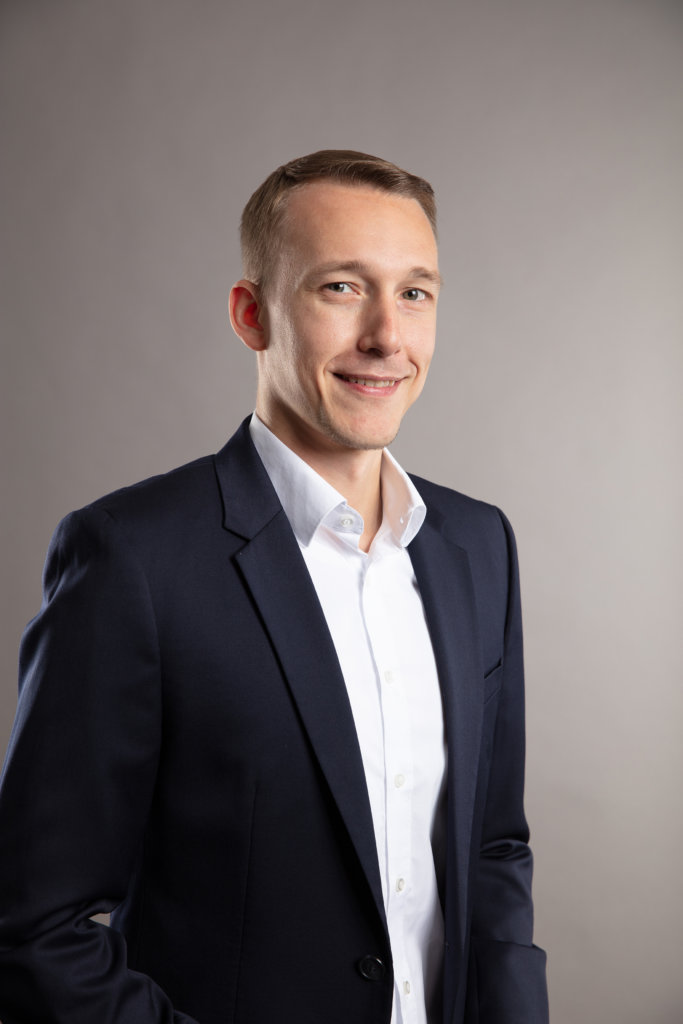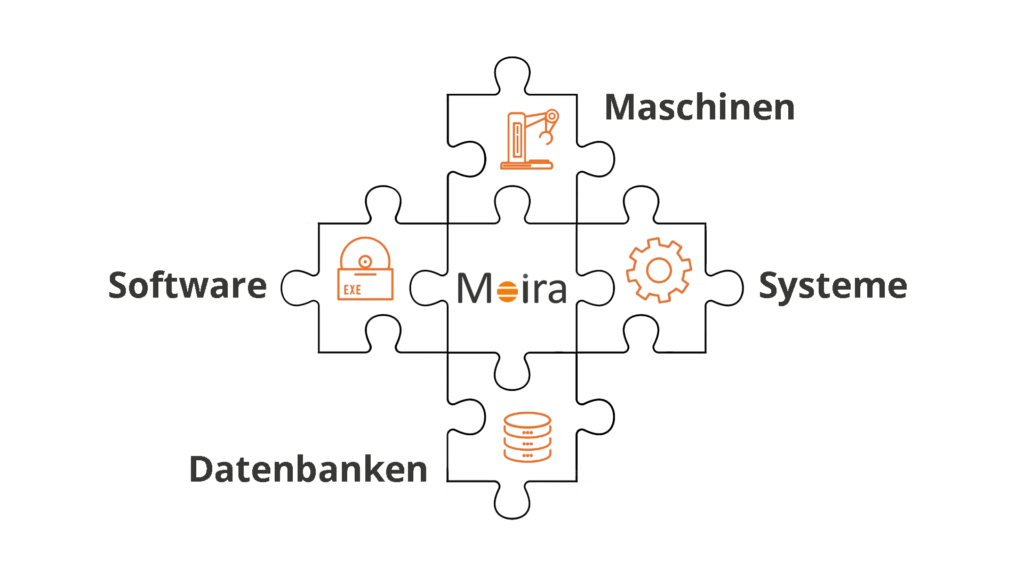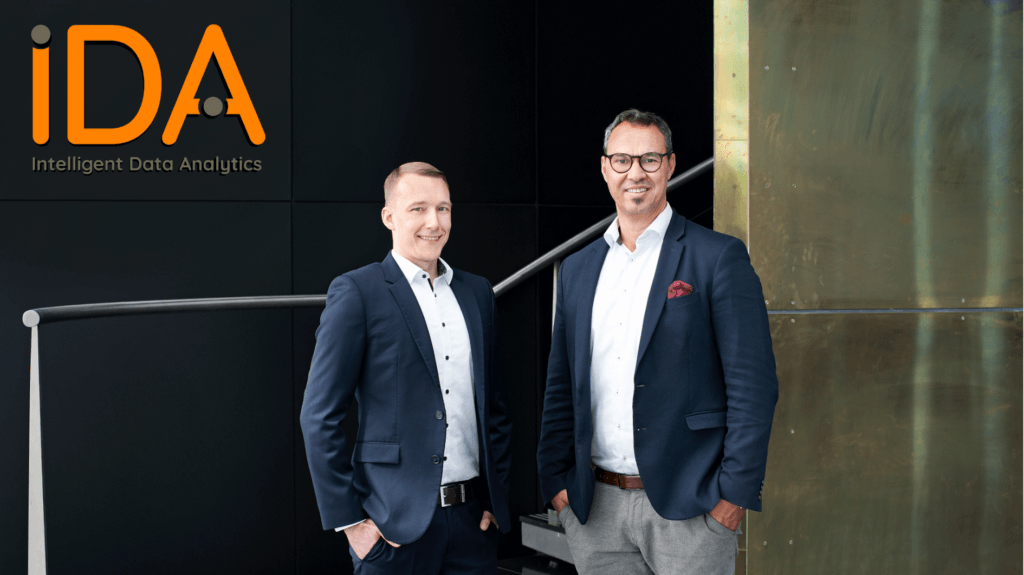"Digitalisation also means that people must be taken along"
Ronja Schrimpf
Making one's own data usable - one business model among many? Not at all, because the startup iDA places special emphasis not only on exploiting companies' data, but also on valuing the expertise of companies' workers. In an interview with 5-HT, Co-Founder and Chief Development Officer Marc Seidemann tells us what makes iDA special, what prejudices it has to contend with and why exactly 5-HT's network is so interesting for the startup.
 Co-Founder and Chief Development Officer Marc Seidemann in an interview 5-HT
Co-Founder and Chief Development Officer Marc Seidemann in an interview 5-HTOne for all: One platform with which all data can be used
"iDA stands for Intelligent Data Analytics. And that is exactly our focus: data analysis," explains Marc Seidemann. When choosing the name, it was important for them to find a name that people would understand on the one hand and that would distinguish the core of the start-up on the other. "Our big goal is to create added value through digitisation projects with artificial intelligence. Our focus is on data. We want to make data usable."
iDA has developed a platform on which all of a company's data can be collected and made usable in a single solution. The software makes it possible to read out the data from the systems, digitise all data processes and visualise the data in a clear way. Especially for the chemical industry, for example, a solution for batch processing was developed on this basis, which always uses the best batch achieved so far in terms of quality, quantity, runtime as well as the lowest possible amount of waste as a reference for further optimisations.
One like the other? Where your business idea differs from others
"Sure, the basic idea of iDA seems similar to other start-ups and companies at first, but we are very different because of our software, which we developed ourselves. What makes us stand out is the way we approach these projects. 'Digitisation' basically always means two things: one is the digitisation of the technological level, the other is the human level, which you must never forget. Digitisation means moving processes away from people to digital patterns. But you shouldn't forget the human being in the process," Marc explains. After all, it is the human being who has the necessary expertise and thus supports the process in the first place. Therefore, says Marc: "Digitalisation also means taking people with you. Our software brings this strength with it.
Through the software, people's knowledge can be transformed into the digital process. At the same time, the software remains transparent and easy to use, even for people with little IT knowledge.
"As a non-professional, you can think of our software as being similar to Microsoft Excel, only not for spreadsheets, but for data processes. The expertise is configured in the form of rules and formulas directly via a user interface in the software." For these rules, iDA uses, among other things, technically very powerful data query and processing languages such as SQL or CEP.
"The software is also flexible. Through it, we are able to connect all the systems that a company uses. So we create an interface between the systems and our software that is designed to be transparent and understandable for all employees," explains Marc, "So our added value is not just the software alone or the analysis of the data, but also the fact that the know-how in the company - the knowledge of the employees - is not lost and is even integrated into the process."
Another advantage of iDA is its location: the start-up is completely based in Germany, with a focus on development in Marburg and sales, marketing and administration in Frankfurt. This means that iDA can be on site if a company has difficulties with the software. Germany is also a selling point with regard to the General Data Protection Regulation, because data protection is indispensable in the production sector. Because, as Marc explains: "Data protection and trust are very important to us."
 Moira – all in one solution
Moira – all in one solutionOne for many: What is iDA's industry focus?
"We see ourselves as a company that does digitalisation in the area of production, even though we also work as a software manufacturer and service provider. Our focus is on data and real-time processing on the one hand, and on the manufacturing industry on the other. Since our founding in 2017, we have also found some customers in the field of IT at airlines, but we have decided to focus on the manufacturing industry," says Marc. The startup has already been able to gain a lot of experience with an innovative-thinking chemical company in Frankfurt since its founding and has thus already gained some knowledge about digitalisation in the chemical sector.
"Of course, we hope to gain a foothold in the chemical industry. Networks are essential in life, especially in this industry, so we are happy to work with 5-HT."
Not one for prejudice: What iDA has to contend with
"Even though the start-up has a convincing solution and even more convinced customers, it has to fight prejudices, especially in the chemical industry, but also in other sectors, which Marc wants to clear up: "Digitalisation does not replace jobs - and especially not in the chemical sector. In fact, the chemical industry, for example, has a completely different problem, namely the shortage and shrinkage of skilled workers. Skilled workers are gradually retiring, there is a lack of young talent and knowledge needs to be conserved before it is lost. Digitalisation is a key element in making the chemical industry interesting again for today's generation and freeing the profession from archaic, repetitive activities such as manual documentation. So it's about being able to preserve existing jobs in the first place and keeping knowledge in the company - which is where our software can support."
Another prejudice against digitalisation revolves around the topic of data protection: "Digitalisation does not endanger data security. We make sure that our software works in a soundly data-protected manner. The data doesn't even have to leave the company for this. In addition, we work with data security partners to ensure the best possible data protection.
When we optimise, we do not optimise people away. That means we optimise processes that should not be done by people at all - because people should be able to bring their expertise to their work and not have to do repetitive tasks that can be digitalised. By optimising and digitising, you can create added value at every level."
Awareness of these biases is something iDA would also like to bring to the 5-HT network.
All for one: How iDA was founded
The founding of iDA is just three years ago: At the beginning of 2017, Hamedo Ayadi, business psychologist and current CEO of iDA, and Marc Seidemann from the field of computer science founded the start-up together with three comrades-in-arms who have since left. Their story began, as with so many companies, with a happy coincidence: Hamedo Ayadi and Marc Seidemann met during a research project on data analysis and got to talking.
 Co-Founder and Chief Development Officer Marc Seidemann (left) and Co-Founder and Chief executive Officer Hamedo Ayadi (right)
Co-Founder and Chief Development Officer Marc Seidemann (left) and Co-Founder and Chief executive Officer Hamedo Ayadi (right)"The research project at the time was coming to an end and we feared that, like many projects, it would simply end up in a drawer. We thought that was a great pity," Marc recalls, "so we thought about how we could use this topic. We spun the idea further and quickly realised that it was not only interesting for IT security, but for digitalisation in general. So we spent the next year and a half developing our software together."
When iDA's software was launched at the beginning of 2017, the start-up quickly found two major customers: One in the IT sector of airlines and the other in the manufacturing industry, a chemical company from Frankfurt. Today, iDA has almost 40 employees and a growing customer base.
There is only one downside to the success for the entrepreneur: "Unfortunately, we were too successful," Marc laughs, "because I don't have that much time for my doctorate at the moment. But it is possible to establish a startup and do a doctorate. That's why I will definitely complete my doctorate."
Everything for the future: What plans iDA is pursuing
"In the past, we have shied away from focusing our start-up too narrowly," explains Marc, "But in the future, we want to focus entirely on the manufacturing industry. We want iDA to become the standard in digitalisation in the manufacturing industry." For now, iDA's plans only apply to Germany, but the international plan will come, Marc is sure.
The company also wants to continue to shake up the industry, especially the chemical industry: "Today, we have a lot of leading companies in Germany, but it doesn't have to stay that way forever. The competition is coming and is already on a par. If we rest on our status, we will be overtaken. Because companies from other countries already have the digitalised technologies. We must not miss the boat."
That's why it is so important for iDA to create awareness of what digitisation of plants means: "We would like to take away companies' fear. The topic of digitalisation is very broad and, above all, very individual."
And not only that, digitalisation also offers completely new opportunities: "Digitalisation also often means generating new business models. It has the potential to create many new opportunities for a company."
5-HT Chemistry & Health Newsletter
Want the latest tech and industry news, events, relevant info from the ecosystem and more?
Subscribe to 5-HT Newsletter now Subscribe to 5-HT Newsletter now
Become part of the 5-HT Chemistry & Health
Exchange ideas with innovative startups and future-oriented companies in our ecosystem. We look forward to meeting you!